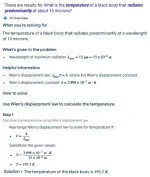- Joined
- Dec 22, 2012
- Messages
- 81,695
- Reaction score
- 27,835
- Location
- Portlandia
- Gender
- Male
- Political Leaning
- Libertarian - Right
I never said it did.Tell us... how does urban heat island effect melting ice in the Arctic?
I never said it did.Tell us... how does urban heat island effect melting ice in the Arctic?
Other areas of science where their conclusions were all wrong!I was asking something else,
Either it's an international hoax or these peers are considering the effects of other factors. My guesses would be the highest GHG concentration in history, and daily tons of constant carbon, and the combination with all the other possible causes you like better. People have gone looking for air bubbles in Antarctic ice core samples and even tree rings. We have no evidence in the past of the rapid acceleration that has happened, like doubling our energy imbalance in just 14 years. So my guess is the concentration of GHGs which has also never happened before. Those authors and their peers don't have the same conclusions as you have posted.
Are there other areas of science where their conclusions are all wrong? Why are all the conclusions in this field of science all wrong, like every single time?
Your objection to every single little thing in science compartmentalizes factors here but the authors are including and linking together other factors.
It's no hoax.
I never said it did.
No true. Your capacity to misinterpret is amazing. You must be a product of our schools after the Depertment ofWell, you've been pretending for years that well known UHI is to blame all the fake global warming and that scientists are either too incompetent to study it and adjust for it properly, or there is a global conspiracy to do so.
Follow what I responded to and stop pretending it was my error. Your error on this must also be from the Department of Indoctrination.You are now posting about UHI on a thread that specifically talks about the ice melting.
I can only assume.So how if global warming is not actually happening much at all (but is simply all due misreads based on UHI), why is ice melting in the south and the north?
Actually, very little ice is melting in the south. Antarctica has very close to a net zero. I attribute most the most ice melt to aerosols. I have explained this in numerous occasions.So how if global warming is not actually happening much at all (but is simply all due misreads based on UHI), why is ice melting in the south and the north?
A black body that emits predominately at 15µ would be a brick of dry ice.
Here's a link to various Temperatures & Planck Curves. and a link to dry ice
and its temperature. Fifteen micron radiation isn't going to warm anything
any more than 109 degrees below zero Fahrenheit.


Good melt that crap free up some more land that's just wasted
Global Sea Ice Hits a New Low
The data comes after researchers reported that the past 10 years have been the 10 hottest on record.www.nytimes.com
Earth is missing a lot of sea ice this year. Enough to cover the entire United States east of the Mississippi.
That was announced by researchers at NASA and the National Snow and Ice Data Center on Thursday, who said the amount of sea ice on the planet had reached the lowest level ever recorded in March.
The record comes days after the World Meteorological Organization reported that the past 10 years have been the 10 hottest on record, with 2024 the hottest year. The global rise in temperatures is tied to increasing concentrations of greenhouse gases, largely caused by the burning of fossil fuels.
“Warming temperatures drive melting ice across the globe, and because we’re seeing such high temperatures, it’s not surprising that this year we’re seeing the least amount of ice coverage,” said Linette Boisvert, an ice scientist at NASA’s Goddard Space Flight Center....
Sea ice plays many important roles for the global climate: Its white surface can reflect energy back into space, helping the planet cool. It also acts like a blanket for the ocean, insulating it and preventing ocean heat from reaching the atmosphere. Less sea ice means more heat goes in Earth’s systems, warming the atmosphere and the oceans.
The extent of sea ice isn’t the only measurement scientists are tracking. The thickness of the ice also matters and, since the 1980s, Arctic sea ice has become thinner.
While thicker sea ice tends to survive the summer melt, nowadays most of the sea ice completely melts during the summer, preventing it from thickening year after year. More open ocean means more dark surfaces to absorb more heat from the sun, which in turn melts more ice. The melting becomes its own positive feedback loop.
Changes in remote polar regions affect the rest of the globe, including changes to ocean currents and weather patterns....
`````````````````````````````
Unwelcome news.
Time to halt funding for these and related studies.....right?
The Planck Curve in my earlier post wasn't all that clear in illustrating that radiation from a black body at 200K was predominately at 15µ. Wandering through the internet found a much better rendition from Researchgate Figure 1 :

The temperature of dry ice is 194.65 K.

Yes, you did.I never said it did.
I think you need an English refresher course.Yes, you did.
